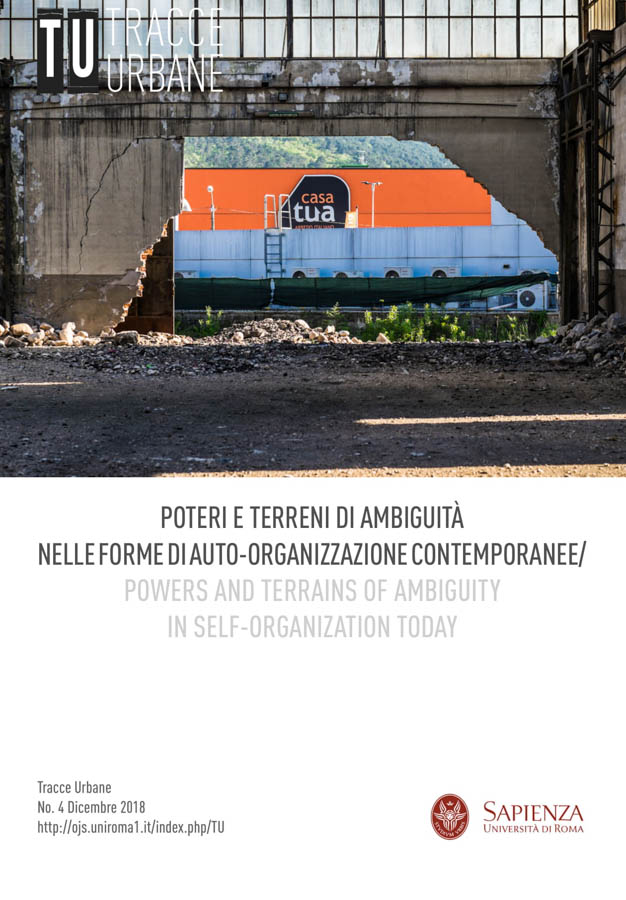Powers and terrains of ambiguity in the field of urban self-organization today
DOI:
https://doi.org/10.13133/2532-6562_2.4.14444Keywords:
self-organization, cities, institutions, practicesAbstract
In this brief Introduction we would discuss powers and terrains of ambiguity in the field of urban self-organization in cities today, particularly as concern the relation with local governments as well as their transformative potential in local communities.
References
Alford J. (2009). Engaging Public Sector Clients: From Service-Delivery to Co-Production. USA: Palgrave Macmillan.
Allen P.M. (1997). Cities and regions as self-organizing systems: models of complexity. Amsterdam: Gordon and Breach Science Publishers.
Agamben G. (2005). Profanazioni. Roma: Nottetempo.
Boonstraa B., Boelensb L. (2011). «Self-organization in urban development: towards a new perspective on spatial planning». Urban Research & Practice, 4, (2): 99–122.
Bruni L. (2012). The wound and the blessing. Happiness, Economics, Relationships. New York: New City Press.
Caillé A. (1998). Il terzo paradigma. Antropologia filosofica del dono. Torino: Bollati Boringhieri.
Castells M. (1983). The City and the Grassroots. Berkeley: University of California Press.
Cottino P., Zeppetella P. (2009). «Creatività, sfera pubblica e riuso sociale degli spazi». Paper commissioned for the project La diffusione delle innovazioni nel sistema delle amministrazioni locali. Roma: Cittalia, Fondazione Anci Ricerche.
Crosta PL. (1998). Politiche. Quale conoscenza per l'azione territoriale. Milano: Franco Angeli.
Davoudi S. (2012). «Resilience: a bridging concept or a dead end? ». Planning Theory and Practice 13.2, 299–307.
de Certeau M. (1990). L’invention du quotidien, I: Arts de faire. Paris: Éditions Gallimard.
de Fillipis, J., Fischer, R., Shragge, E. (2006). «Neither romance nor regulation: re-evaluating community», International Journal of Urban and Regional Research, 30, pp. 673–689.
de Soto H. (1989). The Other Path: The Invisible Revolution in the Third World. London: I.B. Taurus.
de Soto, H. (2000). The Mystery of Capital: Why Capitalism Triumphs in the West and Fails Everywhere Else. New York: Basic Books.
Donati P. (1987). Introduzione alla sociologia relazionale. Milan: Franco Angeli.
Gui B. (1987). «Eléments pour une définition d’économie communautaire». Notes et documents, 19-20: 32-42.
Gotham K.F. (2003). «Toward an Understanding of the Spatiality of Urban as Spatial Actors». International Journal of Urban and Regional Research, 27 (3): 723– 737.
Illich I. (1974). La convivialità. Milano: A. Mondadori.
Kleinhans R. (2017). «False promises of co-production in neighbourhood regeneration: the case of Dutch community enterprises». Public Management Review: an international journal of research and theory, 1-19. DOI: 10.1080/14719037.2017.1287941
Lefebvre H. et al. (1996). Writings on Cities. Cambridge: Blackwell.
Magatti M. (2012). La grande contrazione. I fallimenti della libertà e le vie del suo riscatto. Roma: Feltrinelli.
Nussbaum M. (1986). The Fragility of Goodness: Luck and Ethics in Greek Tragedy and Philosophy. Cambridge: Cambridge University Press.
Ostanel E. (2017), Spazi Fuori dal Comune. Rigenerare, includere, innovare, Milan: FrancoAngeli.
Peck J., Nik T., Brenner N. (2013). «Neoliberal Urbanism Redux? ». International Journal of Urban and Regional Research, https://doi.org/10.1111/1468-2427.12066
Porter M.E., Kramer M.R. (2011). «Creating Shared Value». Harvard Business Review, 89: 62-77.
Roy A. (2009). «Why India cannot plan its cities: Informality, insurgence and the idiot of urbanization». Planning Theory, 8(1): 76-87.
Savini F. (2016). «Self-Organization and Urban Development: Disaggregating the City-Region, Deconstructing Urbanity in Amsterdam». International journal of urban and regional research, doi:10.1111/1468-2427.12469
Swyngedouw E. (2010). «Post-Democratic Cities for Whom and for What? ». Paper Presented in Concluding Session of Regional Studies Association Annual Conference Pecs, Budapest, 26 May 2010.
Thrift N. (1999). «The place of complexity». Theory, Culture and Society, 16(3): 31–69.
Touraine A. (1977). The Self-reproduction of Society. Chicago: University of Chicago.
Uhlaner C. (1989). «Relational Goods and Participation: Incorporating Sociality into a Theory of Rational Action». Public Choice, 62: 253-285.
Uitermark J. (2015). «Longing for Wikitopia: The study and politics of self-organisation». Urban Studies, 52(13) 2301–2312.
Voorberg W.H., Bekkers V.J.J.M., Tummers L.G. (2015). «A Systematic Review of Co-Creation and Co-Production: Embarking on the social innovation journey». Public Management Review, 17:9, 1333-1357, DOI: 10.1080/14719037.2014.930505.
Watson S. (2018). «The Challenges of collaboration and democratic participation in turbulent and unsettled times». TU- Italian Journal of Urban Studies, N° 3/2018, ISSN: 2532-6562.
Downloads
Published
How to Cite
Issue
Section
License
NOTA DI COPYRIGHT
Proposta di licenza Creative Commons
1. Proposta per riviste Open Access
Gli autori che pubblicano su questa rivista accettano le seguenti condizioni:
Gli autori mantengono i diritti sulla loro opera e cedono alla rivista il diritto di prima pubblicazione dell'opera, contemporaneamente licenziata sotto una Licenza Creative Commons - Attribuzione che permette ad altri di condividere l'opera indicando la paternità intellettuale e la prima pubblicazione su questa rivista.
Gli autori possono aderire ad altri accordi di licenza non esclusiva per la distribuzione della versione dell'opera pubblicata (es. depositarla in un archivio istituzionale o pubblicarla in una monografia), a patto di indicare che la prima pubblicazione è avvenuta su questa rivista.
Gli autori possono diffondere la loro opera online (es. in repository istituzionali o nel loro sito web) prima e durante il processo di submission, poiché può portare a scambi produttivi e aumentare le citazioni dell'opera pubblicata (Vedi The Effect of Open Access).


